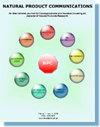南非 Securidaca longipedunculata 不同部位的化学分析和生物活性
IF 1.4
4区 医学
Q4 CHEMISTRY, MEDICINAL
引用次数: 0
摘要
研究结果近似分析表明,与茎皮和根皮相比较,叶提取物的粗蛋白、总能和醚提取物含量更高(P < .05)。矿物质分析也发现了类似的趋势,叶片中含有大量的铜、铁、镁和锌。同时,生物测定显示这些植物部分具有显著的生物活性,如抗氧化、抗菌和抗炎特性。提取物在 250 μg/mL 的浓度下具有很高的脂质过氧化抑制活性,其中深色叶提取物的抑制率最高,达到 94%,其次是 125 μg/mL 和 62.5 μg/mL 浓度下的 92% 和 73%。抗菌分析表明,根皮提取物对大肠杆菌、铜绿假单胞菌和粪肠球菌具有活性,平均最小抑菌浓度为 1.67 毫克/毫升(深色型)和 0.63 毫克/毫升(浅色型)。这项研究为了解龙脑香的药理特性提供了宝贵的见解,为进一步探索药物开发和天然产品发现奠定了基础。本文章由计算机程序翻译,如有差异,请以英文原文为准。
Chemical Analysis and Biological Activities of Various Parts of Securidaca longipedunculata From South Africa
ObjectiveThe objective of our study was to investigate the chemical composition and the biological activities of different parts of Securidaca longipedunculata from South Africa.MethodologiesThe chemical analysis methods, including chromatography and spectroscopy, were employed to identify the diverse array of compounds present in the roots, leaves, and stems of S longipedunculata.ResultsThe proximate analysis revealed that the leaf extracts had higher ( P < .05) crude protein, gross energy, and ether extract contents when compared to the stem bark and the root bark. A similar trend was observed with the mineral analysis where copper, iron, magnesium, and zinc were in abundance in the leaves. Concurrently, bioassays reveal significant biological activities, such as antioxidant, antimicrobial, and anti-inflammatory properties, associated with these plant parts. The extracts demonstrated high lipid peroxidation inhibitory activity at the concentration of 250 μg/mL, with the highest percentage inhibition of 94% recorded in the dark leaf extract, followed by 92% and 73% at the concentrations of 125 and 62.5 μg/mL, respectively. The antimicrobial analysis revealed that the root bark extract was active against Escherichia coli, Pseudomonas aeruginosa, and Enterococcus faecalis with the average minimum inhibitory concentration of 1.67 mg/mL (dark type) and 0.63 mg/mL (light type).ConclusionOur findings emphasize the medicinal potential of S longipedunculata and underscore the importance of understanding its chemical makeup in explaining its therapeutic effects. This research provides valuable insights into the pharmacological properties of S longipedunculata, offering a foundation for further exploration in drug development and natural product discovery.
求助全文
通过发布文献求助,成功后即可免费获取论文全文。
去求助
来源期刊

Natural Product Communications
工程技术-食品科技
CiteScore
3.10
自引率
11.10%
发文量
254
审稿时长
2.7 months
期刊介绍:
Natural Product Communications is a peer reviewed, open access journal studying all aspects of natural products, including isolation, characterization, spectroscopic properties, biological activities, synthesis, structure-activity, biotransformation, biosynthesis, tissue culture and fermentation. It covers the full breadth of chemistry, biochemistry, biotechnology, pharmacology, and chemical ecology of natural products.
Natural Product Communications is a peer reviewed, open access journal studying all aspects of natural products, including isolation, characterization, spectroscopic properties, biological activities, synthesis, structure-activity, biotransformation, biosynthesis, tissue culture and fermentation. It covers the full breadth of chemistry, biochemistry, biotechnology, pharmacology, and chemical ecology of natural products.
Natural Product Communications is a peer reviewed, open access journal studying all aspects of natural products, including isolation, characterization, spectroscopic properties, biological activities, synthesis, structure-activity, biotransformation, biosynthesis, tissue culture and fermentation. It covers the full breadth of chemistry, biochemistry, biotechnology, pharmacology, and chemical ecology of natural products.
 求助内容:
求助内容: 应助结果提醒方式:
应助结果提醒方式:


